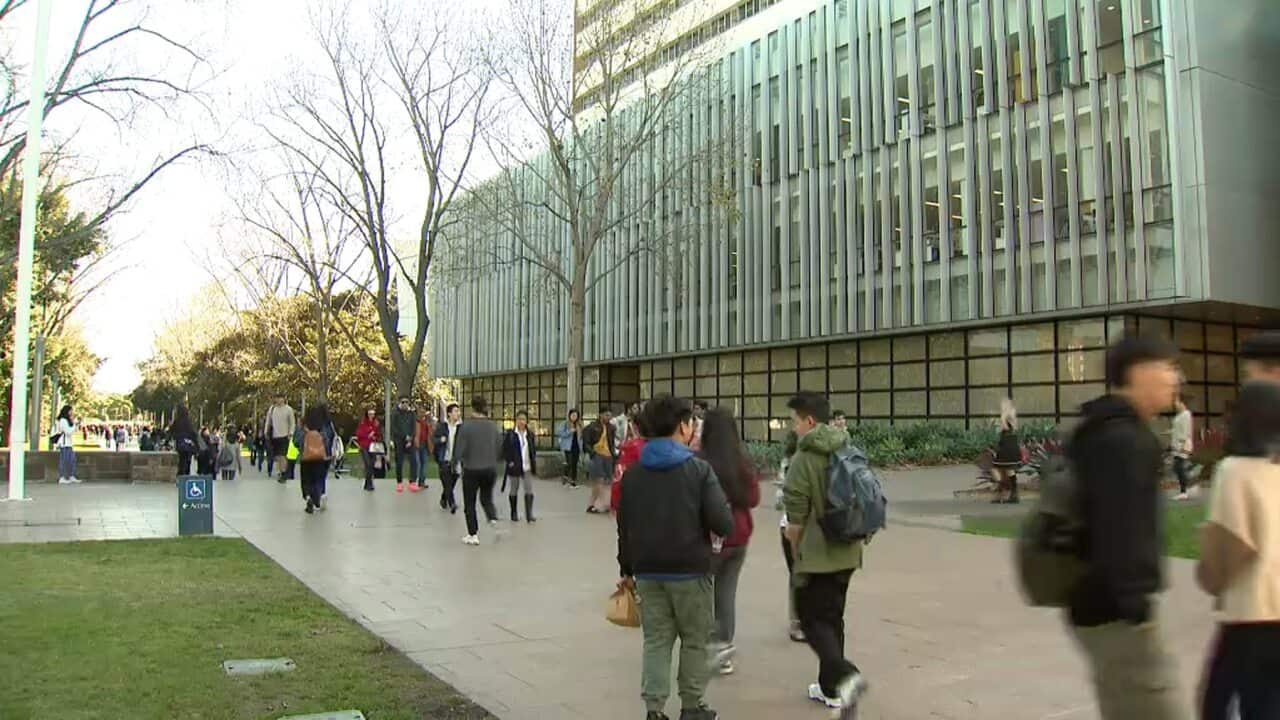A new 102-page report has described Chinese government surveillance of pro-democracy students from China and Hong Kong at Australian universities.
Human Rights Watch's ‘They Don’t Understand the Fear We Have’, which was released on Wednesday, found Australian universities have failed to protect the academic freedom of students from China, and of academics who criticise the Chinese Communist Party.
Pro-Beijing supporters and the Chinese government have also harassed and intimidated those who express support for democracy movements, the study found.
The findings were based on interviews with 24 pro-democracy students from China and Hong Kong and 22 academics.
Hong Kong pro-democracy activist Bonnie Wong is a student at The University of Queensland. She told SBS News she is constantly under surveillance. "When I came to Australia, I thought 'I can utilise my freedom of speech and be free to say whatever I want, to express in support of movements in Hong Kong, also explain to others on what's happening in Hong Kong'," she said.
"When I came to Australia, I thought 'I can utilise my freedom of speech and be free to say whatever I want, to express in support of movements in Hong Kong, also explain to others on what's happening in Hong Kong'," she said.

Bonnie Wong is studying in Australia. Source: Supplied
"But actually here, it's not really safe here for me and other Hong Kongers to do that, so it's a little bit disappointing."
One example of surveillance she spoke of was at a pro-democracy protest at which she noticed pro-Beijing students taking photos of her and posting them on social media to identify her to authorities.
She fears it means she won't be able to return to Hong Kong without serious consequences, and she's scared for her family members who remain there. But she wants to be able to give Hong Kongers a voice.
Human Rights Watch researcher and author of the report Sophie McNeill said "universities like to pretend that this doesn't happen".
"There's been a silence around discussing [the issue] so we really want Australian universities to start speaking out in terms of harassment. We want them to act. We've seen a really disturbing trend of self-censorship among students and academics," she said.
International students surveyed in the report said they felt unprotected and unsupported in Australia, with more than half not reporting harassment to their university.
Ms Wong said she officially reported her concerns to the University of Queensland in a feedback survey.
In an emailed response from the university, sent in July last year and seen by SBS News, its vice chancellor and president Professor Peter Høj said the university has a “commitment to the protection of free speech, evident through our diversity of teaching”.
"By championing causes, staff and students can create change for the betterment of people, the environment, and the economy."
The university has “productive relationships with China however, this does not mean that we are influenced in our decisions or in what we teach,” he said.
Ms McNeill said the biggest thing students interviewed were concerned about was being reported by their fellow classmates to Chinese authorities back home.
"We actually verified three cases of students whose families back home had received threats or were questioned by Chinese police because of things students engaged in, whether it was going to a rally expressing support for democracy," she said.
The study also found more than half of academics self-censoring themselves, something Ms Wong said she had witnessed in class.
"They can't blame China on anything, otherwise the nationalists are going to stand up to argue with you," she said.
"The academies can't afford to talk about China even though something is factual, for example, they actually refuse to talk about the COVID-19 how it originated."
Among the scenarios Human Rights Watch found in Australian universities was one student who was threatened by Chinese authorities with jail after opening a Twitter account and posting pro-democracy messages.
Another student, who expressed support for democracy in front of classmates in Australia, has since had their passport confiscated by Chinese authorities upon returning home.
One statement from a female student from China who attended a Hong Kong pro-democracy demonstration in Australia read: “At around 2 a.m. I received a message from a mainland classmate. He was like, ‘I’m watching you.’"
"Personally, I felt really scared. I went to go see the uni psychologist because I was so stressed. I blocked him [the classmate] on Facebook. I was in a course with 98 per cent mainland students. Students were bad-mouthing me, that I was not loyal to the country.”
The study acknowledged the behaviour does not represent most Chinese students in Australia but Ms McNeill said universities still need to take a stand.
"The first thing to do is for universities to start talking about this, admit that this exists and start coming up with some practical solutions on how to better educate and protect these young students who are in their care."
For now, Ms Wong said she will continue to raise her voice.
"The more I feel suppressed, I actually prefer to forgo my safety rather than human dignity and my fellow Hong Kongers' safety. Every one of us are in danger, but one of us has to speak out and I'm willing to be the one."












